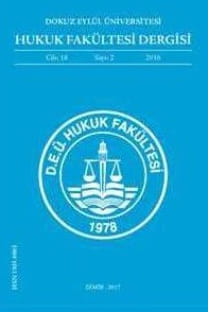ROMA HUKUKUNDA TİCARET SINIRLANDIRMALARI KONUSUNA GENEL BİR BAKIŞ
Roma hukuku kaynakları, ticaretin sınırlandırılması meselesi ile, esas ola-
Anahtar Kelimeler:
Ticaret sınırlandırmaları, patronus, libertus, servus, liberae operae
A GENERAL OUTLOOK ON THE ISSUE OF TRADE RESTRICTIONS IN ROMAN LAW
The legal sources of Roman law, mainly face trade restrictions in thecontext of the relationship between patron and freedman (libertus). It is nocoincidence that, the issue arose in that particular context. Before slaves wereset free, they would often acquire special knowledge and skills from working inthe masters’ businesses. If a slave was set free to administer, the estate of hisformer master as procurator (a representative in terms of a general power ofattorney), his livelihood was secured. In other cases, he had to establish his ownoccupation to survive after his manumission. His obvious choice would havebeen the occupation he had learned under his former master and present patron.For example, the freedman of a medical doctor could become a doctor himselfand the freedman of a slave-dealer did not begin agitate for the abolition ofslavery, but became a slave-dealer himself.
Keywords:
Restraints of trade, patronus, libertus, servus, liberae operae,
___
- Aubert, Jean-Jacques: “Commerce”, in The Cambridge Companion to Roman Law, (ed. Johnston, David), Cambridge University Press, 2015, pp. 213-246.
- Baum, Georg: Das Vertragliche Wettbewerbsverbot, Guttentagsche, Berlin 1914.
- Berger, Adolf: Encylopedic Dictionary of Roman Law, Philadelphia 1953.
- Beseler, Gerhard: “Romanistische Studien”, in Zeitschrift der Savigny- Stiftung für Rechtsgeschichte: Romanistische Abteilung, Vol. 50, Issue 1, Aug. 1930, pp. 18-77.
- Buckland, William Warwick: The Roman Law of Slavery: The Condition of Slave in Private Law from Augustus to Justinian, Cambridge University Press, 1970.
- Camacho López, María Elisa: “El contrato de agencia comercial. Análisis dentro del contexto del derecho romano”, Revista de Derecho Privado, Vol. 16, Jun. 2009, pp. 49-92.
- Coffee, Neil: Gift and Gain-How Money Transformed Ancient Rome, Oxford University Press, 2017.
- De Ligt, Luuk: “Roman Law, Markets and Market Prices”, in The Oxford Handbook of Roman Law and Society, (ed. Du Plessis, Paul J/Ando, Clifford/Tuori, Kaius), Oxford University Press, 2016, pp. 660-671.
- Del Granado, Juan Javier: “The Genius of Roman Law from a Law and Economics Perspective”, 13 San Diego Int’l L.J. Vol. 301, 2011, pp. 301-350.
- Emmett, Arthur R.: “Roman Law, “Private Property and teh Public Domain: Lessons of Copyright Policy”, in Copyright Perspectives, Past, Present and Prospect, (ed. Fitzgerald, Brian/Gilchrist, John), Springer, Switzerland 2015, pp. 17-27.
- Fabre, Georges: Libertus, patrons et affranchis à Rome, Roma, École Française de Rome, 1981.
- Frank, Tenney (editor): An economic survey of ancient Rome, The Johns Hopkins Press, Baltimore 1933-1940.
- Garnsey, Peter: Non-slave labour in The Roman World’in Cities, Peasants and Food in Classical Antiquity, Essays in Social and Economic History, Cambridge University Press, 1998.
- Guggisberg, Paul: Die Konkurrenzklause, (Abhandlungen zum scweizerischen Recht), Bern 1907.
- Karadeniz, Özcan: Iustinianus Zamanına Kadar Roma’da İş İlişkileri, Ankara Üniversitesi Hukuk Fakültesi Yayınları, No. 396, Sevinç Matbaası, Ankara 1976.
- Koops, Egbert: “Price Setting and Other Attempts to Control The Economy”, in The Oxford Handbook of Roman Law and Society, (ed. Du Plessis, Paul J/Ando, Clifford/Tuori, Kaius), Oxford University Press, 2016, pp. 609-621.
- Lavaggi, Giuseppe: “Nuovi studi sui liberti”, in Studi in Onore di Pietro de Francisci, vol. II, Milán, Giuffrè, 1956, pp. 76-110.
- Morley, Neville: Trade in Classical Antiquity, Cambridge University Press, 2007.
- Schiller, A. Arthur: “Restraint of Trade in Classical Roman Law”, (Restraint of Trade), in Mnemosyna Pappulias, Athen 1934.
- Schiller, A. Arthur: “The Business relations of Patron and Freedman in Classical Roman Law”, (Patron and Freedman) in Legal Essays in Tribute to Orrin Kip McMurray, University of California Press, Berkeley 1935, pp. 598-605.
- Schiller, Arthur A.: “Trade Secrets and the Roman Law; the Actio Servi Corrupti”, (Trade), in American Experience in Roman Law, Göttingen 1971, pp.1-10.
- Sirks, Adriaan Johan Boudewijn: “La laesio enormis en droit romain et byzantin”, Tijdschrift voor Rechtgeschiedenis, Vol. 53, pp. 291-307.
- Türkoğlu Özdemir, Gökçe: “Roma Haksız Rekabet Hukukuna İlişkin Olarak Actio Servi Corrupti”, AÜHFD, 2005, Vol.54, Issue 4, pp. 213- 233.
- Van den Bergh, Rena: “Patrons, Freedman and Convenants in Restraint of Trade”, 72 THRHR, Vol.74, 2009, pp. 74-91.
- Wacke, Andreas: “Freedom of Contract and Restraint of Trade Clauses in Roman and Modern Law”, Law and History Review, Vol.11, No:1, Spring 1993, pp. 1-19.
- Waldstein, Wolfgang: Operae libertorum: Untersuchungen zur Dienstpflicht freigelassener Sklaven, Franz Steiner, Stuttgart 1986.
- Waltzing, Jean Pierre: Etude historique sur les corporations professionelles chez les romains, 4 vols. (1895-1900, repr. Hildesheim, 1970), Vol.1, pp.181-190.
- Watson, Alan: “The Devolopment of Praetor’s Edict”, (Praetor), The Journal of Roman Studies, Vol. 60, 1970, pp. 105-119.
- Watson, Alan: Roman Slave Law, (Slave), Johns Hopkins University Press, Baltimore 1937.
- Watson, Alan: The Law of Persons in the Later Roman Republic, (Law of Persons), Claredon Press, 1967.
- Zimmermann, Reinhard: The Law of Obligations, Roman Foundations of the Civilian Tradition, Oxford University Press, 1996.
- http://www.thaliatook.com/OGOD/annona.php, (acsess date: 06.12.2018).
- ISSN: 1303-6963
- Yayın Aralığı: Yılda 2 Sayı
- Başlangıç: 1980
- Yayıncı: Serdar Nart
Sayıdaki Diğer Makaleler
ROMA HUKUKUNDA TİCARET SINIRLANDIRMALARI KONUSUNA GENEL BİR BAKIŞ
UÇUŞUN İPTALİNE VE UZUN GECİKMESİNE SEBEBİYET VEREN “OLAĞANÜSTÜ HALLER”DE SORUMLULUKTAN KURTULMA
İCRAİ VEYA İHMALİ OLARAK SOMUT OLAYDA DAVRANIŞIN GERÇEKLEŞTİRİLİŞ BİÇİMİNİN TESPİTİ MESELESİ
ÖLÜMÜN ŞİRKETLER HUKUKU İLİŞKİLERİNE ETKİLERİ
TÜRK VE KAZAK HUKUKUNDA YABANCI YATIRIMLARIN TEŞVİKİ
İNSAN HAKLARININ SAĞLANMASINDA TEMEL BİR SORUNSAL OLARAK DEMOKRASİ
ÖLÜNCEYE KADAR BAKMA SÖZLEŞMESİNDE BAKIM ALACAKLISININ GÜVENCE SAĞLAMAYA YÖNELİK HAKLARI
ATIK VE ARTIKLARLA ÇEVRENİN KASTEN KİRLETİLMESİ SUÇU (TCK M. 181/1)
AVRUPA İNSAN HAKLARI MAHKEMESİNİN AVRUPA KONSENSÜSÜNE BAŞVURMASI
